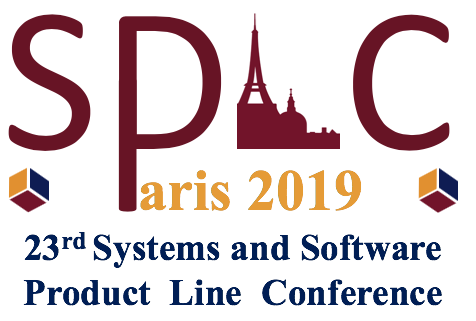The SPLC 2019 Demonstrations, and Tools track provides an opportunity for live demonstrations of academic or commercial systems and software product-line tools. Accepted demonstrations and tools will be presented within a main conference session (using a mix of slides and the running tool) and at demo booths (during a dedicated session or during breaks and on demand). As SPLC 2019 will be collocated with ECSA 2019, there will be great opportunities to also present tools to the software architecture community.
IMPORTANT DATES
- Paper submission: June 4, 2019 (Extended).
- Notification: June 18, 2019.
- Camera-ready papers: July 2, 2019.
TOPICS
Areas of interest include, but are not limited to tools supporting:
- feature modeling,
- variant management,
- validation and verification,
- product derivation and generation,
- product-line testing and further analyses,
- measurement and optimization of non-functional properties of product lines,
- language product lines.
or simply any tool that supports dealing with variability or configurability in different domains such as IT, software-intensive and cyber-physical systems, Web and Cloud-based systems (incl. (micro) service-oriented systems), Internet of Things, consumer electronics, automotive, automation, software ecosystems and multi-product lines, etc.
SUBMISSIONS/PUBLISHING
Demonstration papers should illustrate the existing practice, assumptions behind the concept/approach, and actual or potential limitations and challenges. We welcome both demonstrations of early implementations of novel system or software product line engineering concepts as well as demonstrations of mature tools. The use of realistic use cases is strongly encouraged.
Tool papers must present either a new tool, a new tool component, or novel extensions to an existing tool. Tools previously presented at SPLC should include a specific description of the new features of the tool. Tool papers should provide a short description of the theoretical foundations, after which emphasis should be on the design and implementation concerns (incl. software architecture and core data structures), closed by the description of experience with realistic case studies. It is strongly encouraged to make the tool publicly available, preferably on the web, even if only for the evaluation process.
All demonstration and tool papers must contain a link to a short (max 5 minutes long) video demonstrating the core features of the concept (approach) or tool.
Also, all papers should come with an appendix of at most 2 pages (which will not be published in the proceedings) briefly describing how the concept (approach) or tool will be presented during the conference. This description should have two parts. Part 1 should describe how the concept (approach) or tool will be presented as part of a main conference session and part 2 should describe how the tool will be presented at a demo booth.
Demo booths will come with a table, a poster-stand (so, you can bring a poster, if you want, to support your demonstration), power and WiFi. If you need a monitor or anything else, please either bring it yourself or ask the local conference organizers for help.
The page limit for all demonstration and tool papers is 4 pages (not counting the appendix of at most 2 pages that won’t be part of the camera-ready version). Submissions must follow the ACM proceedings format and will be reviewed by the demonstrations and tools track committee (see below).
All authors should use the official 2019 ACM Master article template. Latex users are advised to use the “sigconf” option, so they are recommended to use the template that can be found in “sample-sigconf.tex”. In this way, the following latex code can be placed at the start of the latex document:
\documentclass[sigconf]{acmart}
\acmConference[SPLC'19]{23rd International Systems and Software Product Line Conference}{9--13 September, 2019}{Paris, France}
The proceedings will be published in the ACM Digital Library.
SPLC is ranked as a top conference.
Submissions should be sent using EasyChair: https://easychair.org/conferences/?conf=splc2019
At least one author of each accepted submission must register and attend SPLC 2019 in order for the submission to be published.
CHAIRS
PROGRAM COMMITTEE
- Mathieu Acher, INRIA Rennes, France
- Vander Alves, University of Brasilia, Brazil
- Maurice ter Beek, ISTI-CNR, Italy
- Ebrahim Bagheri, Ryerson University, Canada
- Elder Cirilo, Federal University of Sao Joao del-Rei, Brazil
- Jane Cleland-Huang, University of Notre Dame, USA
- Philippe Collet, Université Côte d’Azur, France
- Holger Eichelberger, University of Hildesheim, Germany
- Wolfram Fenske, Otto-von-Guericke University Magdeburg, Germany
- Jose A. Galindo, University of Seville, Spain
- Jianmei Guo, Alibaba Group, China
- Marcello La Rosa, Queensland University of Technology, Australia
- Jaejoon Lee, Lancaster University, United Kingdom
- Lukas Linsbauer, Johannes Kepler University Linz, Austria
- Jabier Martinez, Tecnalia, Spain
- Natsuko Noda, Shibaura Institute of Technology, Japan
- Gilles Perrouin, University of Namur, Belgium
- Clément Quinton, University of Lille, France
- Christoph Seidl, TU Braunschweig, Germany
- Stefan Stanciulescu, ABB Corporate Research, Switzerland



